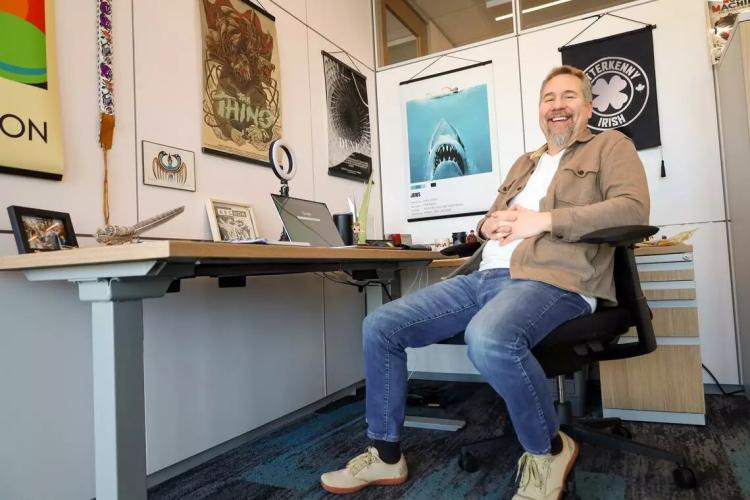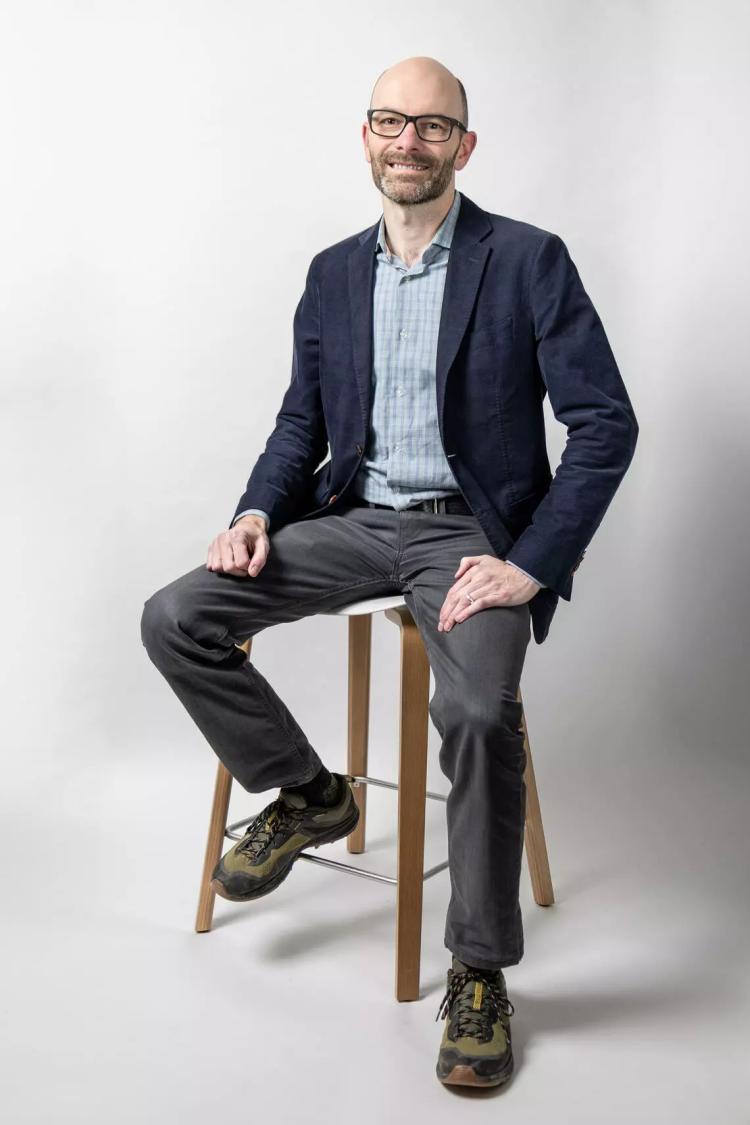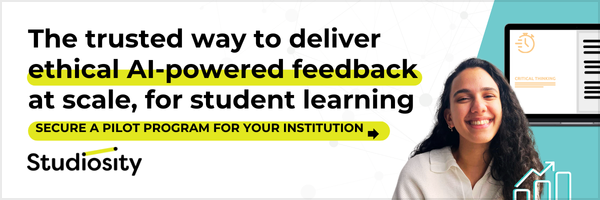Dr. Chad Bousman, PhD, Associate Professor at the Cumming School of Medicine (CSM), is significantly advancing precision medicine; though not as he initially planned.
Upon securing a tenure-track position in the University of Calgary, Bousman built a lab dedicated to translating pharmacogenetic insights into clinically useful recommendations. Currently, physicians assess treatment decisions, like which medication to prescribe, based on clinical guidelines, patient history, side-effect risks and informed consent practices. Recent advancements in pharmacogenetics, however, offer the potential to accurately predict how each patient would uniquely respond to medications based on their genetic profiles; precision medicine in practice.
Bousman quickly realized, however, that his high-tech pharmacogenetic analyses weren't immediately actionable for physicians. So, in 2018, he teamed up with a few undergraduate students during the Neuro Nexus hackathon at UCalgary and developed software that translated complex genetic data into recommendations for physicians.
Proud of their work, Bousman discussed the prototype at academic conferences. Almost immediately, his colleagues began asking for access to the software. "We have this problem too," they would say. "Can we use your software?" But it wasn't set up for others to use. He realized he needed to polish the system into a reliable product that could be more widely adopted. He needed to start a company; Sequence2Script was born.
Today, the startup is improving patient care not just in Alberta but internationally, providing thousands of physicians and patients with genetically informed decision-making. Though just a few years ago founding a company never crossed his mind, he now finds himself at the junction of academic research and entrepreneurial action.
He finds himself an academic entrepreneur.
The Academic's Expanding Responsibilities
For decades, universities have been tasked with expanding the horizons of human knowledge, rigorously refining and validating it within specialist communities, and transferring it to the next generation through education. Now this responsibility is evolving.
Like Bousman, many academics find themselves developing and sitting on new ideas with the potential to solve major challenges requiring highly technical, innovative approaches. Solutions that society needs.
One way to realize those solutions is through academic entrepreneurship.
The Incredible Opportunity of Academic Entrepreneurship
Major research institutions like UCalgary are recognizing the exciting possibilities that arise when academic research meets entrepreneurial action. By growing its support for academic entrepreneurship, UCalgary is offering researchers an alternative path, one filled with opportunities to solve pressing challenges and make a tangible impact.
Academic entrepreneurship stands apart from traditional entrepreneurship in its potential for impact, owing to the unique characteristics of universities.

Jeff Ryzner in his office, where he regularly mentors dozens of UCalgary students, postdocs, researchers, and professors looking to make an impact through successful entrepreneurial ventures. Photo Courtesy: Jason Curtis Droboth
This is clear to people like Jeff Ryzner, Senior Manager, Programs at the Hunter Hub for Entrepreneurial Thinking. Ryzner has over 25 years of experience in entrepreneurship across Canada, mostly outside academic walls. Having recently migrated to a university setting, he sees how universities have a special capacity to solve the world's most complex problems.
While traditional entrepreneurs often have the business acumen and drive but struggle to find a good idea, academic entrepreneurial startups are conceived upon cutting-edge knowledge and deep expertise. "Academics have the ideas most entrepreneurs dream of," says Ryzner. Universities are designed to expand the horizon of human knowledge, meaning they're constantly producing new innovative ideas. Some with the potential for serious impact.
"Academics have the ideas most entrepreneurs dream of..."
Universities also offer something few other environments can match: the ability to pursue long-term, high-risk, high-reward projects. "The type of research being advanced at universities is difficult to do elsewhere because of the high cost and the incredibly long development timeline," says Ryzner. "Few companies, startups or otherwise, are willing or able to fund research with possible returns sometimes a decade away." An entrepreneur working out of their garage might be able to create a new app or professional service, but they're less likely to develop improvements in precision medicine via genetic insights. This work increasingly depends upon universities.

As an academic entrepreneur, Dr. Chad Bousman finds that his research and entrepreneurial pursuits strengthen and enhance one another. Photo Credit: Jason Curtis Droboth
While highly supportive of idea discovery, university ecosystems are also conducive to idea development, given their unrivalled talent pool. According to Ryzner, this is perhaps the most underappreciated asset for entrepreneurs based in universities. "If you want to build a successful company, you're going to need a highly skilled team," says Ryzner. "But finding the right talent is a universal challenge." Universities, however, provide easy access to the top talent. "Within a few blocks," he observed, "there are experts in virtually every field, from engineering to marketing, from design to government policy. The sheer density of knowledge and skill is unmatched outside academic ecosystems." This remarkable talent pool can allow academic entrepreneurs to make significant progress on a tight budget early on.
This wealth of talent is complemented by access to world-class facilities often unattainable outside universities. Bousman's lab, for example, has provided him with access to a wealth of high-tech gear. "I have access to all the toys I could never afford on my own," Bousman jokes. Having access to state-of-the-art tools allows academic entrepreneurs like Bousman to develop, test, iterate, and perfect complex and leading-edge processes and products to advance patient care through precision medicine, all for a fraction of the cost outside the university.
"Within a few blocks, there are experts in virtually every field, from engineering to marketing, from design to government policy. The sheer density of knowledge and skill is unmatched outside academic ecosystems."
Finally, engaging in entrepreneurial activities while at UCalgary can provide grad students and postdocs with expanded career options, outside the traditional, and highly competitive, tenured professorship. They may find themselves better able to leverage their hard-earned valuable skills and knowledge into different kinds of impact, if they desire.
Overcoming Challenges in Academic Entrepreneurship
While the opportunities are immense, academic entrepreneurship is far from easy. Researchers often face challenges such as balancing academic and entrepreneurial responsibilities, navigating complex funding landscapes, and overcoming institutional barriers that prioritize traditional academic outputs. Additionally, transforming groundbreaking research into viable products or services can be a daunting process requiring extensive de-risking and commercialization.
These challenges, however, can be successfully addressed with the right knowledge, resources, approaches, and support. Something UCalgary has committed to providing to reach its strategic Ahead of Tomorrow goals.
This article is the first in a series designed to help aspiring academic entrepreneurs at UCalgary think about, prepare for, and tackle the challenges. Future articles will help readers consider the place and value in quality mentorship, the nuances and importance of funding, and much more.













